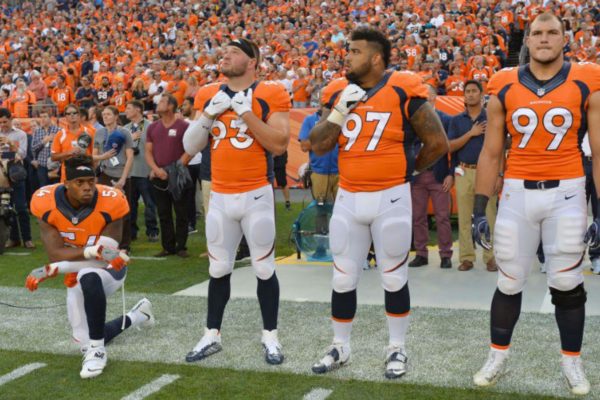The National Football League recently announced a new policy that says players may now remain in the locker room during the “The Star-Spangled Banner” — reversing a requirement imposed in 2009. On the field or on the sidelines, however, players must “stand and show respect for the flag and the anthem” or the team will be fined. Individual teams may impose additional requirements on their players.
The new policy, trying to please everyone, pleases almost no one. The policy, however, is not unfair. The NFL just went about it all wrong.
President Donald Trump expressed qualified support. “I don’t think people should be staying in the locker rooms, but still I think it’s good,” he said. Vice President Mike Pence tweeted a simpler statement: “#Winning.”
The NFL Players Association, however, announced its opposition. The Players Coalition leader Malcolm Jenkins said, “What NFL owners did today was thwart the players’ constitutional rights to express themselves and use our platform to draw attention to social injustices like racial inequality in our country. Everyone loses when voices get stifled.”
Jonathan Jones, writing in Sports Illustrated, denounced the policy in stronger terms: “It is intended to hide its mostly black players who wish to speak up, through their actions, about inequality in criminal justice and police brutality against people of color … It is meant to chill the speech of the players whose voices have grown louder than the players — and owners — imagined they could go.”
Does the policy — whatever its wisdom, intention or effect — violate players’ rights? No.
The answer has nothing to do with the merits of the NFL’s policy. It has nothing to do with the merits of the protesting players’ position or the Black Lives Matter movement. It has nothing to do with agreement or disagreement with the president’s agenda.
The First Amendment’s guarantee that “Congress shall make no law … abridging the freedom of speech” protects political speech — but not anywhere, anytime, in any manner. It doesn’t protect political speech in private workplaces. You have a right to free speech, but not on the job.
The principle is simple. After hours: Do your thing. At work: Do your job.
The National Labor Relations Act, passed as part of the New Deal in 1935, protects employees’ right to organize. But it doesn’t protect their right to non-union-related political activity on the job. In general, the NLRA protects political activities only if they take place after hours, off premises. It allows policies that restrict purely political expression during working hours.
There are good reasons for this. Political expressions on the job may alienate customers. For the NFL, ratings declined 8 percent in 2016 and another 9.7 percent in 2017. They may cause conflicts among workers or place workers who disagree in difficult positions, such as when Pittsburgh Steeler Alejandro Villanueva was the only player to be on the field for the anthem. They may lead to claims of political discrimination, retaliation or harassment. An example: Colin Kaepernick has filed a grievance.
Players and teams should face no penalties for players’ political activities off the field. The Players Coalition members should be allowed to advocate for social justice all they want — but not on the field, at game time.
The NFL’s policy on player protests, therefore, doesn’t violate players’ rights.
What the policy did do is provide a textbook example of how not to handle a crisis. The NFL was slow to listen and slow to respond. It failed to articulate clear principles or values. It didn’t consult the players or their union. It brought a damaging issue back to the front page. It suggested self-interested motives. Roger Goodell’s statement could even be read as blaming the fans for forming “a false perception.”
Worst of all, the league’s policy seems guaranteed to keep the issue alive. Allowing some players to remain in the locker room while others stand for the anthem, and allowing some teams to impose policies and penalties other teams don’t, promotes division and keeps the focus off the game.
In short, the NFL’s new policy isn’t unjust. But it is unwise.
Daniel Bonevac is a professor of philosophy at The University of Texas at Austin.
A version of this op-ed appeared in the San Antonio Express News and the Austin American Statesman.
To view more op-eds from Texas Perspectives, click here.
Like us on Facebook.




